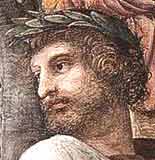Enniusz słynne cytaty
„Nie jest zwycięzcą ten, co zwyciężył, jeżeli zwyciężony nie uznał swej klęski.”
Źródło: O wojnie, wojsku i żołnierzach – dla żołnierzy… (myśli – aforyzmy – sentencje), wybór Bogdan M. Szulc, Adam Marszałek, 1995, s. 224.
„Pewnego przyjaciela poznaje się w niepewnym położeniu.”
Amicus certus in re incerta cernitur. (łac.)
Źródło: Cyceron, Laelius de Amicitia, 17, 64
Enniusz: Cytaty po angielsku
“The idle mind knows not what it wants.”
Otioso in otio animus nescit quid velit.
As quoted by Aulus Gellius in Noctes Atticae (Attic Nights), Book XIX, Chapter X
Iphigenia
“A sure friend is known in unsure times.”
Amicus certus in re incerta cernitur.
As quoted by Cicero in De Amicitia, Chapter XVII
“He who has conquered is not conqueror
Unless the conquered one confesses it.”
Qui vincit non est victor nisi victus fatetur.
As quoted by Marcus Servius Honoratus in In Vergilii carmina comentarii (Commentaries on the poems of Virgil), Book XI https://web.archive.org/web/20141219124307/http://www.perseus.tufts.edu/hopper/text?doc=Perseus%3Atext%3A1999.02.0053%3Abook%3D11%3Acommline%3D306
“And earth who herself bestowed the body takes it back and wastes not a whit.”
Terram corpus quae dederit, ipsam
capere neque dispendi facere hilum.
As quoted by Varro in De Lingua Latina, Book V
“Fortune is given to brave men.”
Fortibus est fortuna viris data.
As quoted by Macrobius in Saturnalia, Book VI, Chapter I
“There is no fellowship inviolate,
no faith is kept, when kingship is concerned.”
Nulla sancta societas
Nec fides regni est.
As quoted by Cicero in De Officiis Book I, Chapter VIII - translation by Walter Miller
Variant translation: To kingship belongs neither sacred fellowship nor faith.
“Neither you nor any man alive shall do this unpunished: no, you shall give recompense to me with your life-blood.”
Nec pol homo quisquam faciet inpune animatus
hoc nec tu; nam mi calido dabis sanguine poenas.
As quoted by Macrobius in Saturnalia; Book VI, Chapter I
Compare: Tu tamen interea calido mihi sanguine poenas persolves amborum, Virgil, Aeneid, Book IX, line 422
“Let no one pay me honor with tears, nor celebrate my funeral rites with weeping. Why? I fly, living, through the mouths of men.”
Nemo me lacrumis decoret neque funera fletu
faxit. Cur? volito vivos per ora virum.
As quoted by Cicero in Tusculanae Disputationes, Book I, chapter XV, section 34
“As a strong horse that has often won on the last lap at Olympia is now resting, tired out by old age.”
Sicut fortis equus, spatio qui saepe supremo
Vicit Olympia, nunc senio confectus quiescit.
As quoted by Cicero in De Senectute, Chapter V (tr. K. Volk)
“Who kindly sets a wand'rer on his way
Does e'en as if he lit another's lamp by his:
No less shines his, when he his friend's hath lit.”
Homo qui erranti comiter monstrat viam,
Quasi lumen de suo lumine accendat facit;
Nihilo minus ipsi lucet, cum illi accenderit.
As quoted by Cicero in De Officiis, Book I, Chapter XVI - translation by Walter Miller
“where the Gauls stealthily, at the time of night when sleep falls on men, attacked the high citadel and of a sudden stained with blood walls and watchers.”
Qua Galli furtim noctu summa arcis adorti
moenia concubia vigilesque repente cruentant.
As quoted by Macrobius in Saturnalia, Book I, Chapter IV (tr. J. Elliott)
“Your minds that once did stand erect and strong,
What madness swerves them from their wonted course?”
Quo vobis mentes, rectae quae stare solebant
Antehac, dementis sese flexere viai?
As quoted by Cicero in De Senectute, Chapter VI (Loeb translation)
“No one regards what is before his feet; we all gaze at the stars.”
Quod est ante pedes nemo spectat, caeli scrutantur plagas.
As quoted by Cicero in De Divinatione, Book II, Chapter XIII
Iphigenia
“No sooner said than done—so acts your man of worth.”
Dictum factumque facit frux.
As quoted by Priscianus in Ars Prisciani, Book VI
“The Roman state survives by its ancient customs and its manhood.”
Moribus antiquis res stat Romana virisque.
Annals, Book V
“Whom none could overcome with iron or gold.”
Quem nemo ferro potuit superare nec auro.
As quoted by Cicero in De Re Publica, Book III, Chapter IV
Iron is a metonym for sword/warfare, and gold for money/bribery.
“Open your eyelids, will you all, and let your brains leave sleep behind.”
Pandite sultis genas et corde relinquite somnum.
As quoted by Festus, in De verborum significatione (Loeb translation)
“The mind wanders unsure, except in that life is lived.”
Incerte errat animus; praeterpropter vitam vivitur.
As quoted by Aulus Gellius in Noctes Atticae (Attic Nights), Book XIX, Chapter X
Iphigenia
“The ape, vilest of beasts, how like to us!”
Simia quam similis turpissima bestia nobis!
As quoted by Cicero in De Natura Deorum, Book I, Chapter XXXV
Variant translation: How like us is that ugly brute, the ape!
“Not chaffering war but waging war, not with gold but with iron—thus let us of both sides make trial for our lives”
Nec cauponantes bellum sed belligerantes;
Ferro non auro vitam cernamus utrique.
As quoted by Cicero in De Officiis, Book I, Chapter XII
“One man, by delaying, restored the state to us.
He valued safety more than mob's applause;
Hence now his glory more resplendent grows.”
Unus homo nobis cunctando restituit rem.
Noenum rumores ponebat ante salutem;
Ergo plusque magisque viri nunc gloria claret.
Of Fabius Maximus Cunctator, as quoted by Cicero in De Senectute, Chapter IV (Loeb translation)
“Whom they fear, they hate. And whom one hates, one hopes to see him dead.”
Quem metuunt oderunt; quem quisque odit, perisse expetit.
As quoted by Cicero in De Officiis, Book II, Chapter 23
“All mortals desire themselves to be praised.”
Omnes mortales sese laudarier optant.
As quoted by Augustine of Hippo in De Trinitate, Book XIII, Chapter III
